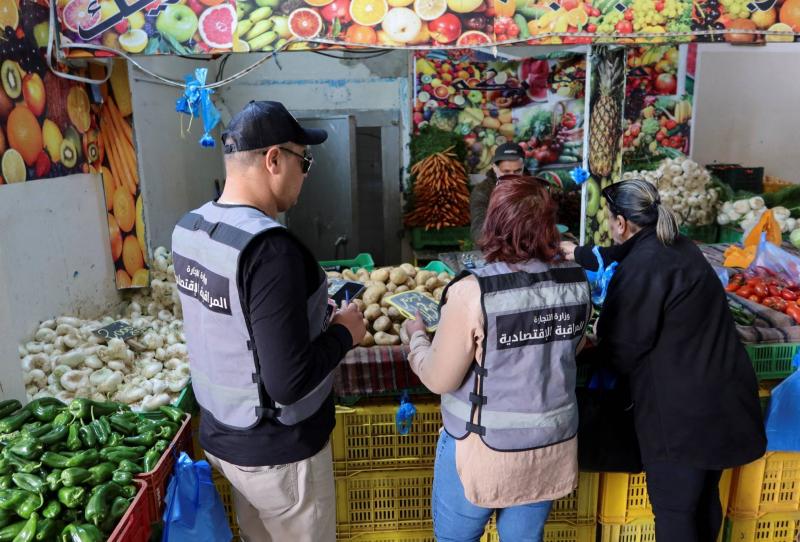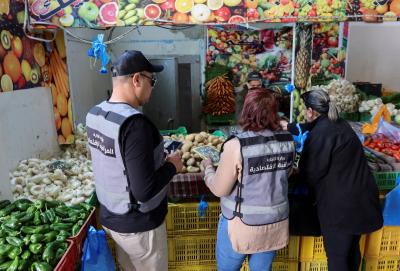Basma Marzouki's steps were heavy as she strolled through the central market in Nabeul, northeastern Tunisia, carrying a plastic bag containing only leafy vegetables and tomatoes. "We can no longer face the crazy and significant rise in prices," she added, "The pace of modern life has forced us to abandon our grandmothers' traditions. Ramadan returns us to these traditions with a deep nostalgia for celebrating the holy month, but we are also compelled to give up many habits, whether it's preparing food or making sweets that we long to eat during Ramadan and Eid."
**Ramadan Basket Loses Its Components**
The Tunisian shopping basket for Ramadan has lost some of its components due to the soaring prices, making families unable to present the dishes they were accustomed to during the month of fasting. Sharifa Ben Arab, a widow whose monthly pension after 18 years of work in a garment factory is only $120, spoke about her struggles with this meager amount, which does not cover her medicine and food in light of the rising prices of all goods.
Data from the National Institute of Statistics indicated that food prices rose by 15.7% in March due to increases in lamb prices by 34.2%, eggs by 31.3%, poultry by 23.8%, cooking oils by 23.7%, and beef by 21.8%. In contrast to Sharifa, the impact of the severe economic crisis in Tunisia has been less harsh on the retired employee Khaldoun Ben Amou (65 years old) because his daughter works in a Gulf state and provides him with monthly remittances, which has helped him manage the cost of living for himself and his wife.
**Income Levels Insufficient for Living Costs**
The Tunisian Organization for Consumer Defense stated that it is no longer possible to accurately determine the income standards for the average Tunisian citizen in light of the price explosion, which has also affected other sectors besides consumer goods, such as transportation, fuels, internet, rent, and energy. The organization's president, Ammar Dia, said: "We used to talk about an average income ranging between 1,000 and 1,500 dinars; this income is no longer enough to cover the living costs in Tunisia today."
Tunisians usually cling to their customs during Ramadan by securing necessities despite the difficult economic conditions and the escalating rise in food prices. They also strive to uphold the traditions and rituals their ancestors practiced over the years during this month. However, they are now forced to abandon some of their habits, particularly those related to their eating behavior, leading to a decline in consumption of costly dishes such as lamb, which has risen to $15 per kilogram, along with a reduction in the consumption of fresh dairy, dried fruits, eggs, and other products that were staples at Tunisian family tables during Ramadan.
The president of the Tunisian Organization for Consumer Guidance, Lotfi Riahi, held the state responsible for the rising cost of living in Tunisia due to its letting markets operate under the laws of supply and demand. He added in a statement to Reuters: "It is the state's responsibility to protect consumers and citizens by setting prices, especially for widely consumed goods." Riahi argued that the state's reliance on traditional and temporary mechanisms to curb prices may yield results for a brief period but will not be sufficient to put an end to "the inflationary tide of prices that is striking the purchasing power of Tunisians noticeably."
**Government Measures.. But**
The authorities imposed a series of measures before Ramadan in an attempt to control prices, such as setting profit margins and maximum selling prices for essential products like eggs and chicken, as well as some fruits like bananas and apples. They also established "from producer to consumer" points selling at lower prices in several regions and implemented monitoring of retailers.
Families have reduced their engagement in making Eid sweets, such as “Samsa,” which primarily consists of dried fruits, butter, and sugar, due to the high costs or shortages of raw materials like sugar, for which Tunisians have been queuing for hours in search of a kilogram. Tunisia is experiencing a severe shortage of a list of essential materials, in addition to rising fuel and transportation costs, which may further increase the pressures on the pockets of Tunisians, especially with the government's announcement of a gradual reduction in subsidies, signaling a looming economic crisis.




